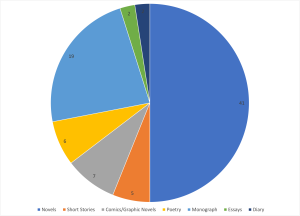First, and most obviously for this week: the blog has a new domain and a new design. I figured that if I am taking this thing at all seriously, I should at the very least move it off of blogger. So here we go. I will most likely be teaching the design in the next few weeks as I figure out how to use WordPress, but all the content is here, and the updates will continue apace.
The second change, which I meant to implement last week but then forgot about, is that all of this week’s articles (but not videos, songs, etc.) are available as a Readlist. That puts everything in one place, in a nice, clean, readable format. I am also compiling a list for the whole year, which will be updated continuously and is available here.
And with that, on to this week’s recommendations:
Article: “Don’t Take Medical Advice From the New York Times Magazine” by Michelle M. Franci
This was an article that I immediately wanted to post to every possible forum, stuff in everyone’s email, and otherwise share through any mechanism available. The single most practically useful thing I got from my dissertation research, I think, was a deep suspicion of the word “natural.” If by “natural” we want to indicate something which exists in a state prior to or apart from any human influence, well, we will essentially never encounter such a thing— and if we did, there is no reason to think it would be good for us. Arsenic is natural. Chlorine is natural. Cobras and black widows are natural.
By the same token, the mere fact that something is made by human beings does not make it dangerous or harmful— nor, I would argue, does it make that thing unnatural; we are, after all, as much a part of nature as anything else, whether or not we think of ourselves in those terms. But I constantly hear people expressing a desire for products (of all kinds: soap, food, food storage) without “chemicals” (or, most often, “all those chemicals”). As Franci points out, everything is a chemical. And the fact that something has a polysyllabic name does not mean it is any less safe, or any less natural, than something that sounds more familiar. And yet people, like the woman in the article that Franci is critiquing, continue to make important health decisions according to completely arbitrary criteria.
My favorite example of this, personally, is BPE— the stuff that used to be in almost all plastic water bottles, and which most now eschew, often being prominently labeled as “BPE Free.” BPE did, in fact, present some health risks, but generally pretty minor ones; the odds that you would be exposed to enough of it to cause a problem through normal usage of a Nalgene bottle were slim. BPE had been tested pretty thoroughly in multiple clinical experiments, Now, due to the public outcry, we have replaced this with materials which have been much less rigorously tested, and whose health risks are basically unknown. This is not an improvement.
Obituary: “John E. Karlin, Who Led the Way to All-Digit Dialing, Dies at 94” by Margalit Fox
John Karlin is one of those people whom you’ve likely never heard of (I had not), but who has nonetheless changed you life in very tangible ways.
Mr. Karlin, associated from 1945 until his retirement in 1977 with Bell Labs, headquartered in Murray Hill, N.J., was widely considered the father of human-factors engineering in American industry.
A branch of industrial psychology that combines experimentation, engineering and product design, human-factors engineering is concerned with easing the awkward, often ill-considered marriage between man and machine. In seeking to design and improve technology based on what its users are mentally capable of, the discipline is the cognitive counterpart of ergonomics.</blockquote>
Among other things, he came up with the rectangular button layout for touch-tone phones— a small thing, but an inescapable one. Mostly, I find this interesting because it underlines the fact that “design” (which we now tend to refer to as an abstraction, not the design of something but “design” in some broader, deeper sense) is often (usually?) a game of millimeters, an attempt to shave fractions of a second off the time it takes us to dial a phone— a way of making tasks so natural as to be unconscious.
Article: “Welcome to the Malware-Industrial Complex” by Tom Simonite
We all realize, hopefully, that there are people out there who devote a lot of effort to getting access to our private information. The recent Wired cover story about the problems inherent in passwords as a means of protecting this information, as well as an article I posted last year about the new methods available for cracking your passwords pretty easily— not to mention those constant notifications from Norton or McAfee— demonstrate how pervasive this problem is. We are also probably aware, though perhaps in a dimmer way, that governments around the world are increasingly engaged in “cyberwarfare” (doesn’t anything with the prefix “cyber” attached automatically sound like it is stuck in 1994?) I had never thought, though, about the connections between those two things. Simonite discusses the growing market for “zero-day exploits,” holes in software that are present when it first ships and which companies have not yet discovered or had time to fix. Where there used to be some pride in announcing the discovery of one of these holes, more recently those who discover them are likely to keep their findings quiet in order to sell the information on a vibrant exploit market, where buyers include various U.S. government agencies, who want to use the exploits in cyber warfare operations. One result is that they have become very expensive— which sort of seems like a good thing, because it means that they are less accessible. But the fact that our government is increasingly focused on “offensive” network operations is…disturbing? I’m not entirely sure.
Video: “Retrograde” by James Blake
Technically, I posted this song last week, so this is a bit of a repeat; but, that was audio only, and it was a radio rip, to boot. This is the official video, and the sound quality is much better. so I think that gives me an excuse. Plus, if you want an image of my musical experience for the last week, you need only play this song over and over and over.
Finally, this was kind of a crappy week, for a variety of reasons. You know what will make the worst week look a bit brighter, though? A Bucket of Sloths (by Lucy Cooke).
BUCKET OF SLOTHS from Lucy Cooke on Vimeo.


